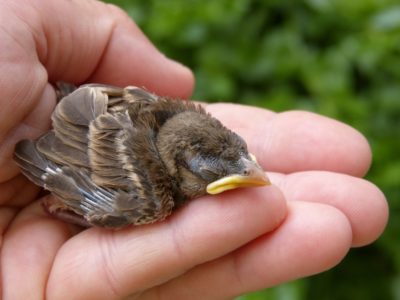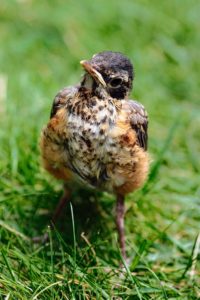We’re deep into spring, which means that baby birds are hatching all around the city! If you happen to stumble upon a grounded baby bird, don’t fret; you can easily help it.
First, identify whether or not the baby bird is injured:
- Does it have open wounds?
- Is it bleeding?
- Is it unable to use a leg or a wing?
- Was it in another animal’s mouth?
- Is it cold, wet, or covered in fly eggs (which look like small grains of rice)?
If you answer “yes” to any of these questions, the bird needs immediate attention. Call us at (202) 882-1000.
If the bird is not injured, the next thing you need to do is identify its age.
If the baby bird is fully feathered (i.e., no skin showing and the tail feathers have begun to grow), but unable to fly, then it is a fledgling. Fledglings are birds who have left the nest, but are still learning how to fly. They spend most of their time on the ground. During this time, their parents continue to feed and protect them. The fledgling stage can last as long as fourteen days. It is best to leave fledgling birds alone. If the fledgling is in a dangerous location, you can move it a few yards, so that it is no longer in danger, but still able to be found by the parents.




The young avian could have fallen from the nest due to bad weather. It could also be caused by an unstable nest or a poor attempt to get out to find food. However, when you find a baby bird on the ground with no nest, it’s important to identify whether the baby passerine is a hatchling, a nestling, or a fledgling.
Hatchlings are newly hatched baby birds. They have zero to very few feathers, with their skin almost bare and eyes not outright open. Hatchlings cannot walk or fly yet, and they are fully dependent on their parents.
Well, thank for sharing useful information. I have more knowledge from reading your posting. This helps me a lot. Nature has many wonderful things that I want to know. Hope you write more.
With its wings and freedom to explore the borderless sky, we all once imagined being a bird traveling the world. But have you ever wondered, where do baby birds go when they leave the nest?